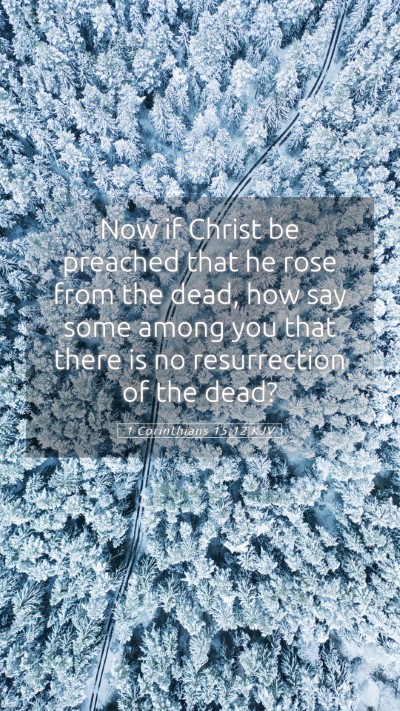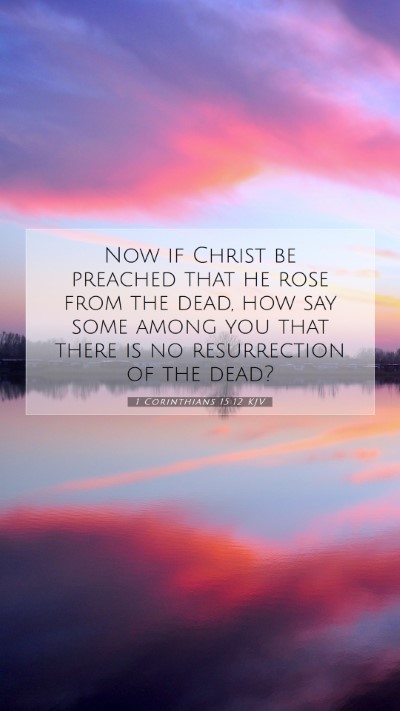Understanding 1 Corinthians 15:12
Verse Reference: 1 Corinthians 15:12 - "Now if Christ is preached that he rose from the dead, how say some among you that there is no resurrection of the dead?"
Overview
This verse is a pivotal inquiry posed by the Apostle Paul, addressing a critical issue in the Corinthian church regarding the resurrection. In this context, Paul is emphasizing the importance of the resurrection of Christ as a foundation for the Christian faith and then questioning the inconsistency in their belief about the resurrection of believers.
Commentary Insights
This analysis draws from insights provided by renowned public domain commentaries, incorporating the thoughts of Matthew Henry, Albert Barnes, and Adam Clarke.
Matthew Henry's Commentary
Henry emphasizes the necessity of Christ's resurrection in the Christian doctrine. He notes that if Christ, who is central to the faith, has indeed been raised from the dead, then it is contradictory for any believer to assert that there is no resurrection for the dead. This highlights the unity of resurrection in the understanding of faith. Henry warns of the dangers of disbelief, as undermining the resurrection belief could lead to disbelief in Christ himself.
Albert Barnes' Commentary
Barnes provides a detailed look at the implications of denying the resurrection. He points out that Paul frames his argument by appealing to the established truth that Christ did indeed rise, establishing that the core of their belief system depends on this truth. He emphasizes that Paul's rhetorical questioning is aimed at persuading the audience on the foundational essence of resurrection—both of Christ and believers—thereby illustrating the necessity of holding onto this truth for salvation and hope.
Adam Clarke's Commentary
Clarke expands the discussion by providing historical context, suggesting that there were various philosophical influences within Corinth, such as the Sadducees who denied supernatural events, which might have influenced some church members. He stresses that the resurrection should not be viewed solely as a future event; it also presents immediate implications for the Christian life. He emphasizes the vital link between acknowledging Christ's resurrection and the assurance of believers' resurrection, regarding it as a critical tenet to personal faith and community belief.
Importance of the Resurrection
The resurrection of Christ is a cornerstone of Christian faith, symbolizing victory over sin and death. The implications of denying this event extend to the very fabric of Christian assurance and hope.
- Victory Over Death: The resurrection signifies triumph over death, granting believers confidence in eternal life.
- Foundation of Faith: Acknowledging Christ's resurrection is essential for a robust theological understanding and belief structure.
- Inspiration for Living: The truth of resurrection provides motivation for believers to live according to God's will, inspired by the promise of their own resurrection.
Cross References
Several Scriptures reinforce the themes presented in 1 Corinthians 15:12:
- Romans 10:9: "If you declare with your mouth, 'Jesus is Lord,' and believe in your heart that God raised him from the dead, you will be saved."
- 1 Thessalonians 4:14: "For we believe that Jesus died and rose again, and so we believe that God will bring with Jesus those who have fallen asleep in him."
- John 11:25-26: "Jesus said to her, 'I am the resurrection and the life. The one who believes in me will live, even though they die; and whoever lives by believing in me will never die. Do you believe this?'"
Application in Daily Life
The teachings derived from 1 Corinthians 15:12 challenge believers to reflect on their own faith. By affirming the resurrection, Christians are called to embrace their identity in Christ, live out their faith authentically, and share the hope found in the resurrection with others.
Conclusion
1 Corinthians 15:12 encapsulates a critical issue of belief among early Christians, serving as a reminder for contemporary believers regarding the significance of the resurrection in shaping their theology and daily living. It encourages ongoing engagement with Scripture for deepened understanding and application of biblical truths.


